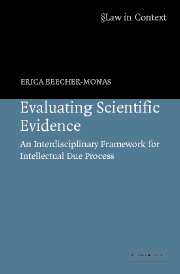Book contents
- Frontmatter
- Contents
- Acknowledgments
- Evaluating Scientific Evidence
- Introduction
- 1 Triers of science
- 2 What is intellectual due process?
- 3 A framework of analysis
- 4 Toxic torts and the causation conundrum
- 5 Criminal identification evidence
- 6 Future dangerousness testimony: The epistemology of prediction
- 7 Barefoot or Daubert? A cognitive perspective on vetting future dangerousness testimony
- 8 Future dangerousness and sexual offenders
- 9 Models of rationality: Evaluating social psychology
- 10 Evaluating battered woman syndrome
- Conclusion
- Index
- The Law in Context Series
Conclusion
Published online by Cambridge University Press: 04 December 2009
- Frontmatter
- Contents
- Acknowledgments
- Evaluating Scientific Evidence
- Introduction
- 1 Triers of science
- 2 What is intellectual due process?
- 3 A framework of analysis
- 4 Toxic torts and the causation conundrum
- 5 Criminal identification evidence
- 6 Future dangerousness testimony: The epistemology of prediction
- 7 Barefoot or Daubert? A cognitive perspective on vetting future dangerousness testimony
- 8 Future dangerousness and sexual offenders
- 9 Models of rationality: Evaluating social psychology
- 10 Evaluating battered woman syndrome
- Conclusion
- Index
- The Law in Context Series
Summary
Law's moral authority is based on the accuracy of its assumptions and predictions and how they are applied in crafting legislation, deciding disputes, and engaging in scholarly debate. Throughout, this book explored how scientific evidence has become a cornerstone in the construction and application of assumptions and predictions that are fundamental to the realization of justice in all of law's aspects, whether in legislation, adjudication, or scholarship. As we have canvassed, contests over what counts as genuine and reliable science, how those contests should get resolved, and who gets to resolve them are active and pervasive topics in the legal communities of the United States, England, and other Commonwealth jurisdictions. Allowing scientifically baseless or flawed evidence to poison or influence any of the law's processes is not only cynical, it also undermines law's moral authority. The very least that can be done in a system aspiring to do justice is to thoroughly test, carefully scrutinize, and properly limit data that carry the imprimatur of science.
A critical theme running throughout this book argues that although untrained in science, judges are fully capable of deciding what counts as science, and that it is their responsibility to do so. Too often, however, perhaps because of the daunting complexities of science, many shy from that duty, with dire consequences to the rule of law and those seeking justice within it. Conceiving the rule of law as a search for truth in a system that aspires to rationality has consequences.
- Type
- Chapter
- Information
- Evaluating Scientific EvidenceAn Interdisciplinary Framework for Intellectual Due Process, pp. 232 - 238Publisher: Cambridge University PressPrint publication year: 2006

